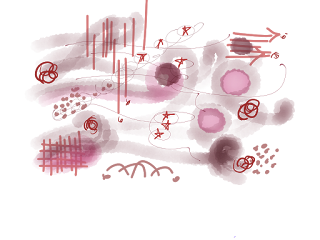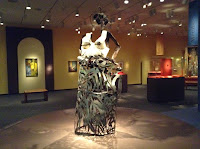Welcome to the last day/week of class! Our time to analyze communities entangled, learning, social change, and how it all works together!
>>Reread this year's title of the course and say something about why it was added to the catalog title?
tangled community, entangled communities: lesbians and always more
>>Reread the description of this year's version of the course too, and talk about how it explains why the title should properly change year to year?
The term “lesbian community” might well mean something different in each decade since the 1970s when gay women began to use the term lesbian to describe themselves and feminism had to stop dyke baiting practices. Recently at UMD the LGBT Studies program became folded into our WMST department and there is talk about changing both names, but to what? And this last year a new scholarly journal began its first volume, named TSQ or Transgender Studies Quarterly. Transnational politics, legalities, travel, and scholarship under various names and umbrella terms have their own histories and timelines, something very unevenly obvious in and to the US. So in 2015 there are many questions to explore about lesbian communities. How do they/we name them/ourselves? What communities do we discover to be entangled here, how does naming matter, what intersectionalities should we center or network, what national and transnational ranges are our proper contexts for investigation? Are communities something to work for or against and why? Do communities protect or police or include or exclude those who might want to work together in solidarity today?
Today we share with each other our experiences of the class and our understanding of what has changed. This is our time capsule to ourselves: we see how things looked to us at different moments during the semester, at different times in the story of the course.
===

Celebrating each others' work and our own, and especially thinking together today about the knowledge we each bring into being is the collective project here.
So listen as carefully as you speak, because active listening is also necessary to collective thought.
If someone else says something you intended to say, then -- thinking on your feet -- find another something to say that is a unique bit of your own work instead.
Focusing exercises for presenting:
EVERYONE:
1) find your favorite paragraph in the learning analysis. Put a star next to it.
2) write down what you are most proud of in this paper.
3) put an arrow next to the place you think best describes the argument of the course.
4) write down your favorite reading and be prepared to say what element of its ANALYSIS made it special for you.
PICK ONE OF THESE TOO:
=write about a moment in the course where everything seemed to come together for you.
=write about a moment outside the course where you realized you were using something you had learned in the class.
=write about a moment when you discovered something new about how you were included in the argument of the class.
WHEN IT IS YOUR TURN TO SPEAK:
pick out two of these to share during your five minutes. (Have at least two others as mental backups, so that you don't say the same thing someone else says.) Focus on analysis -- of the course, readings, experiences, realizations -- especially, although feelings and politics have important places too.
Give some real details: don't be too general. Do show off the hard thinking you are capable of. Make sure what you say is special and unique.
And may we keep running into each other, over and over, in friendship and connection and intellectual community and joyful living!
===


























